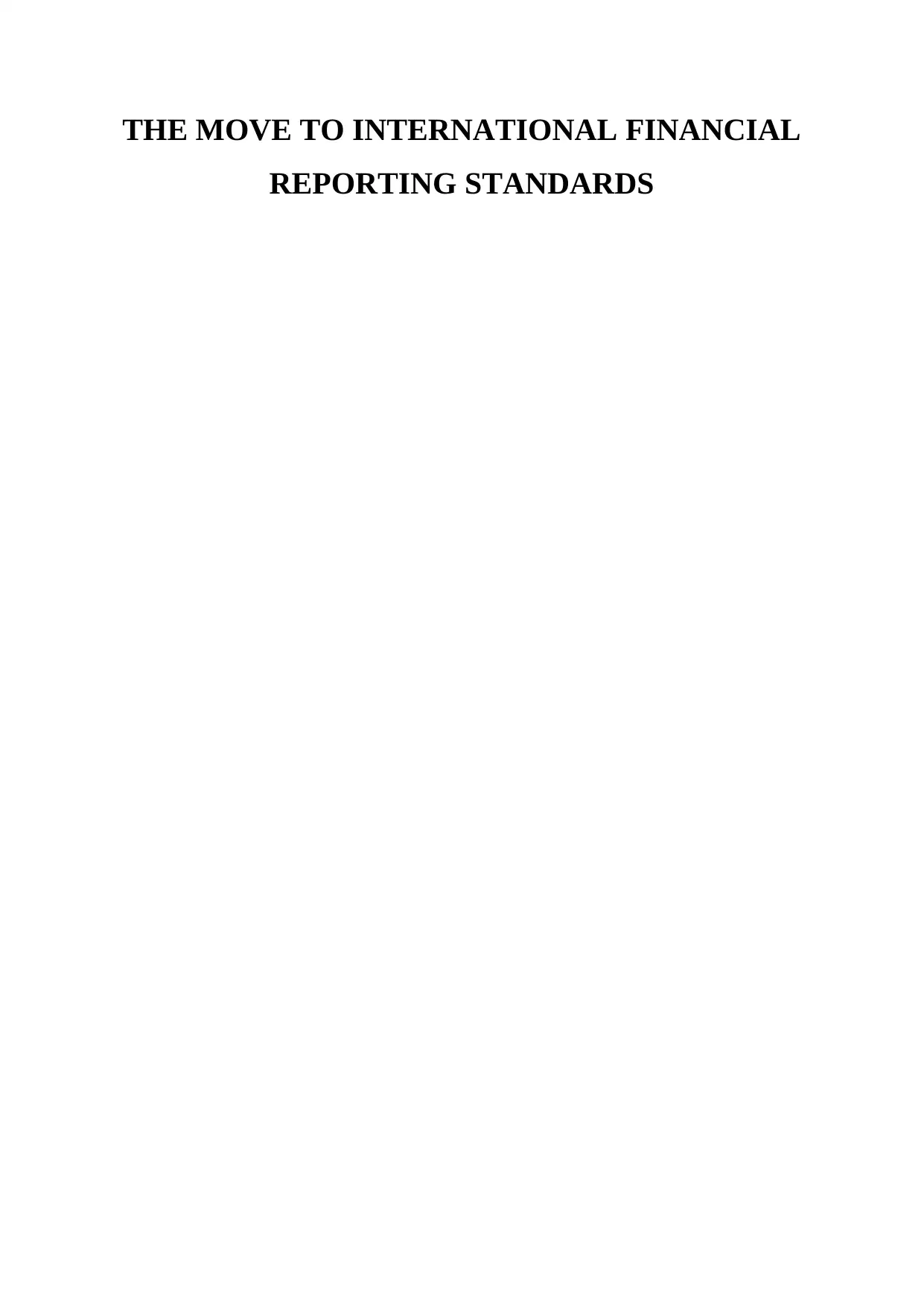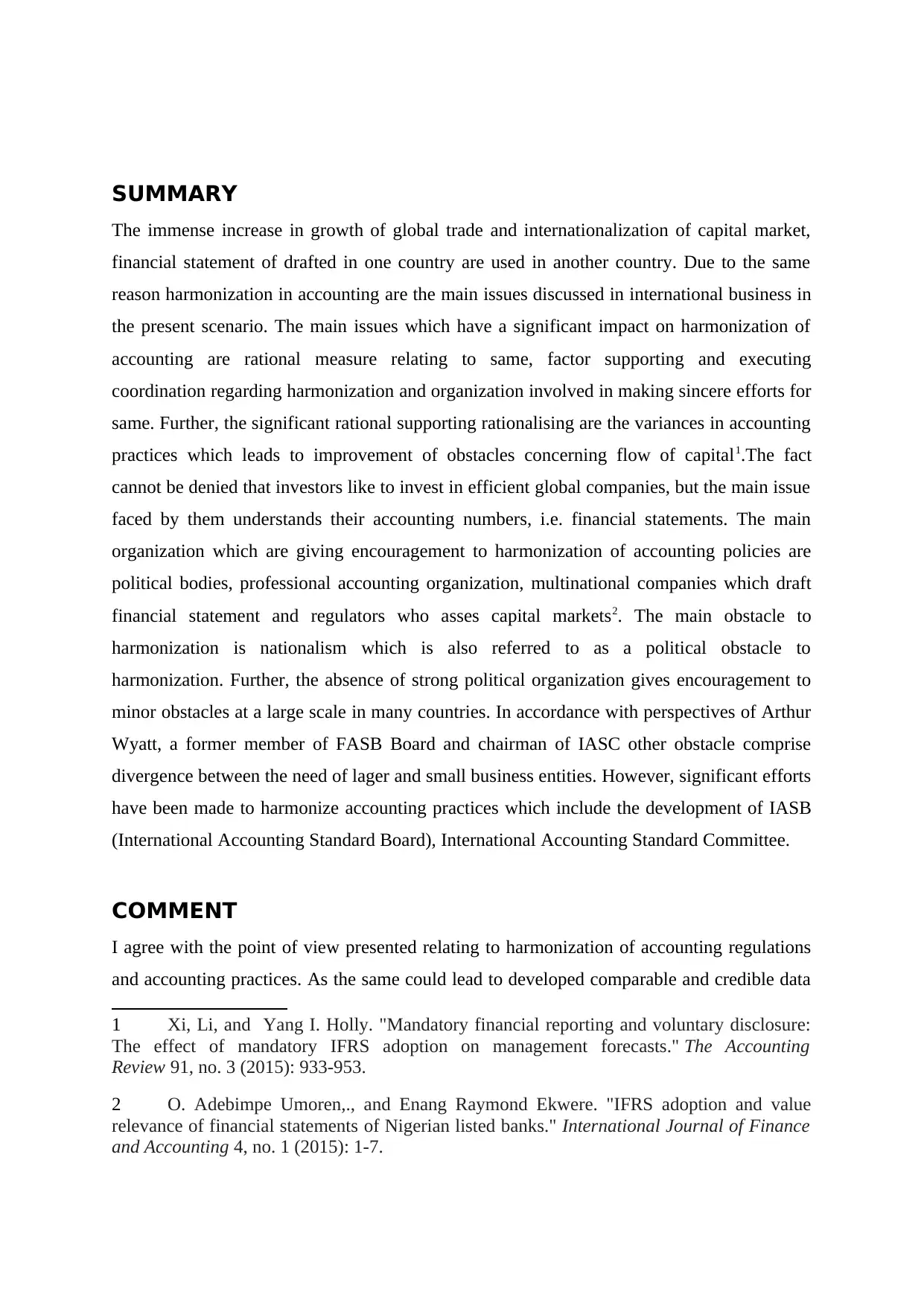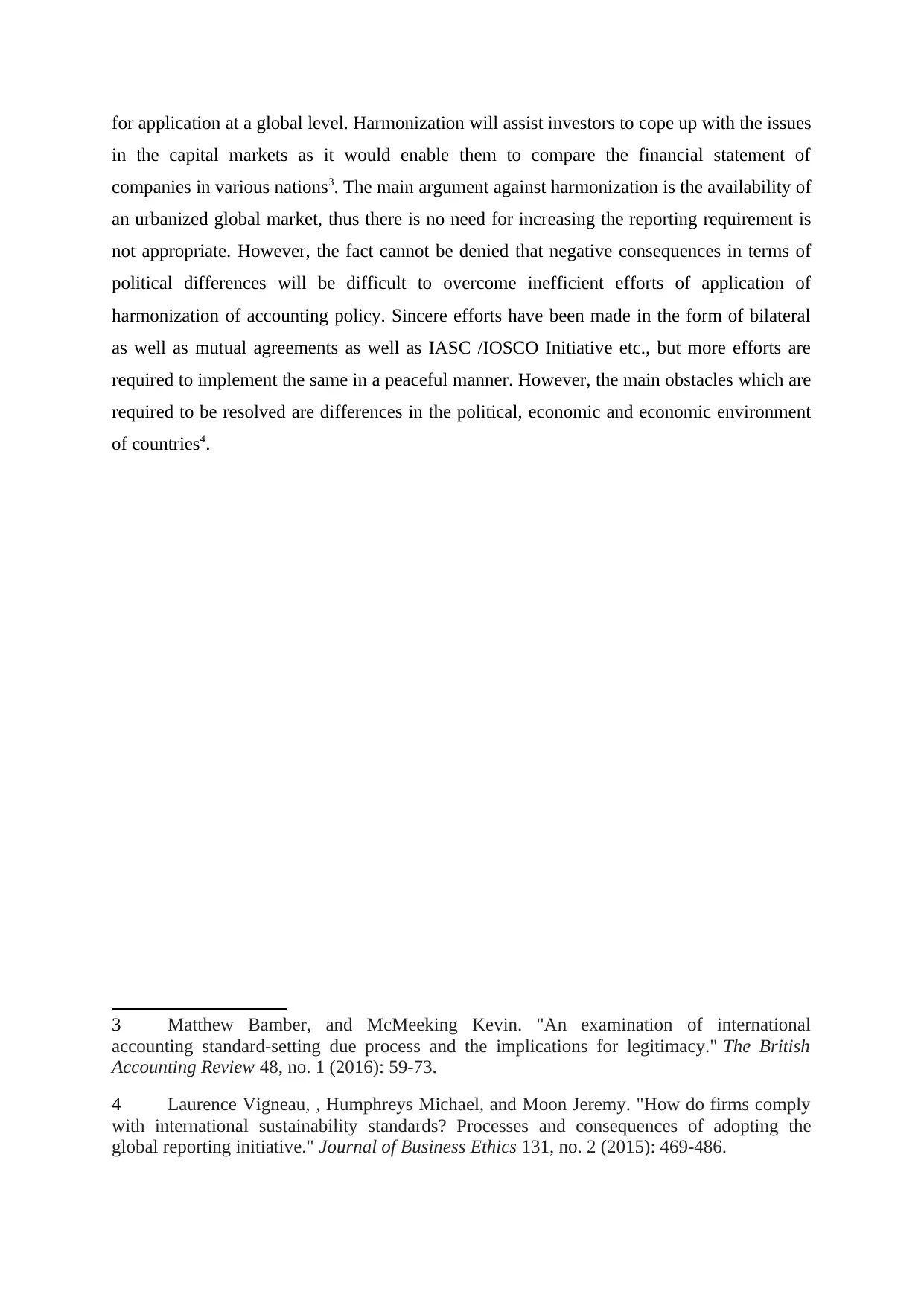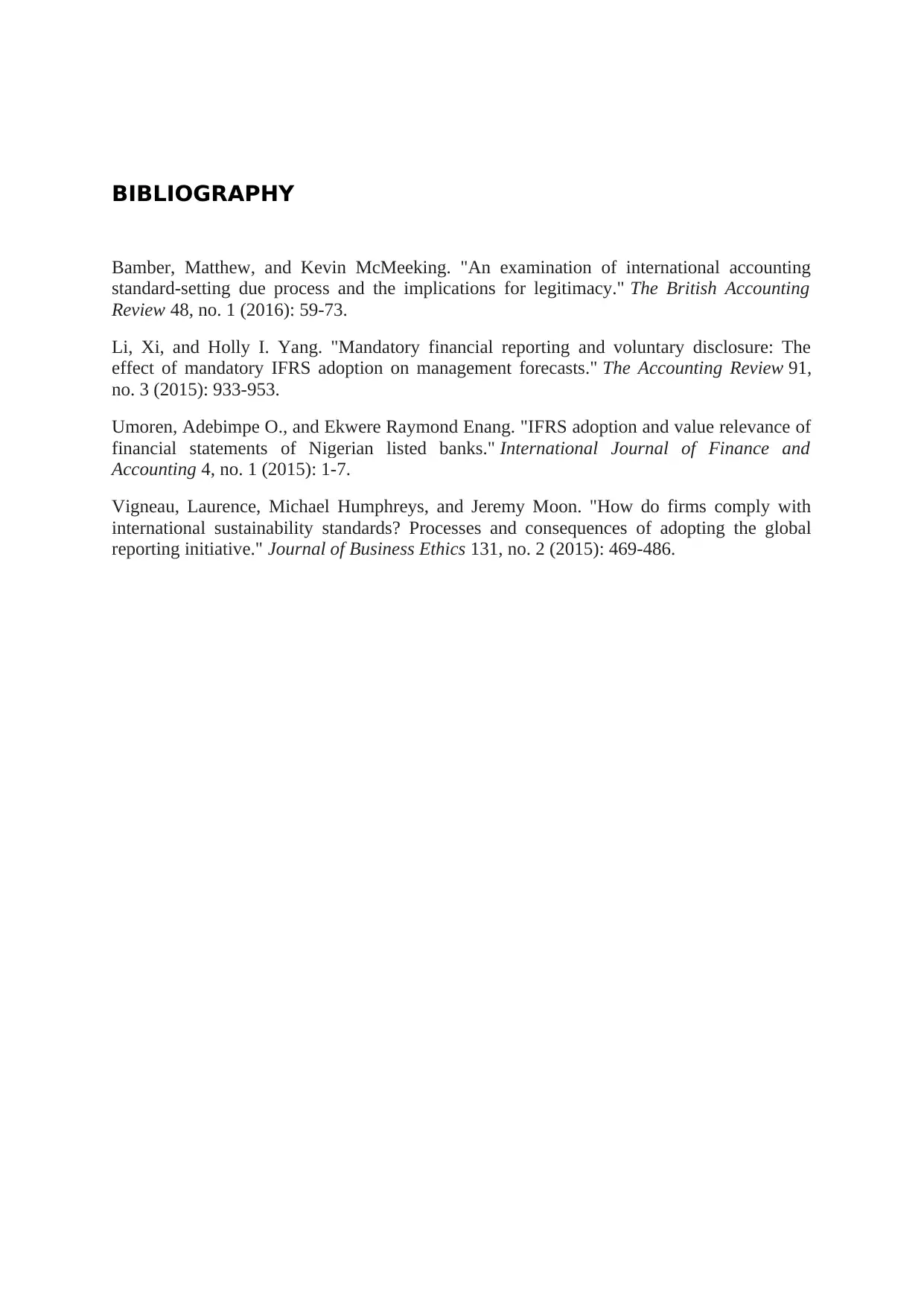Harmonization of Accounting: An IFRS Perspective Report
VerifiedAdded on 2023/04/24
|5
|826
|74
Report
AI Summary
This report explores the critical topic of International Financial Reporting Standards (IFRS) and the harmonization of accounting practices. It examines the arguments supporting harmonization, such as increased comparability of financial statements for global investors, and the obstacles hindering its implementation, including nationalism and differing economic environments. The report highlights key organizations like the IASB and IASC involved in driving harmonization efforts and discusses the pressures and obstacles affecting the process. It emphasizes the importance of comparable and credible data for global capital markets and addresses the challenges of overcoming political and economic differences. The report also references several academic sources to support its analysis and provides a concise overview of the current state and future of IFRS harmonization.

THE MOVE TO INTERNATIONAL FINANCIAL
REPORTING STANDARDS
REPORTING STANDARDS
Paraphrase This Document
Need a fresh take? Get an instant paraphrase of this document with our AI Paraphraser

TABLE OF CONTENTS
Summary....................................................................................................................................3
Comment....................................................................................................................................4
Bibliography...............................................................................................................................5
Summary....................................................................................................................................3
Comment....................................................................................................................................4
Bibliography...............................................................................................................................5

SUMMARY
The immense increase in growth of global trade and internationalization of capital market,
financial statement of drafted in one country are used in another country. Due to the same
reason harmonization in accounting are the main issues discussed in international business in
the present scenario. The main issues which have a significant impact on harmonization of
accounting are rational measure relating to same, factor supporting and executing
coordination regarding harmonization and organization involved in making sincere efforts for
same. Further, the significant rational supporting rationalising are the variances in accounting
practices which leads to improvement of obstacles concerning flow of capital1.The fact
cannot be denied that investors like to invest in efficient global companies, but the main issue
faced by them understands their accounting numbers, i.e. financial statements. The main
organization which are giving encouragement to harmonization of accounting policies are
political bodies, professional accounting organization, multinational companies which draft
financial statement and regulators who asses capital markets2. The main obstacle to
harmonization is nationalism which is also referred to as a political obstacle to
harmonization. Further, the absence of strong political organization gives encouragement to
minor obstacles at a large scale in many countries. In accordance with perspectives of Arthur
Wyatt, a former member of FASB Board and chairman of IASC other obstacle comprise
divergence between the need of lager and small business entities. However, significant efforts
have been made to harmonize accounting practices which include the development of IASB
(International Accounting Standard Board), International Accounting Standard Committee.
COMMENT
I agree with the point of view presented relating to harmonization of accounting regulations
and accounting practices. As the same could lead to developed comparable and credible data
1 Xi, Li, and Yang I. Holly. "Mandatory financial reporting and voluntary disclosure:
The effect of mandatory IFRS adoption on management forecasts." The Accounting
Review 91, no. 3 (2015): 933-953.
2 O. Adebimpe Umoren,., and Enang Raymond Ekwere. "IFRS adoption and value
relevance of financial statements of Nigerian listed banks." International Journal of Finance
and Accounting 4, no. 1 (2015): 1-7.
The immense increase in growth of global trade and internationalization of capital market,
financial statement of drafted in one country are used in another country. Due to the same
reason harmonization in accounting are the main issues discussed in international business in
the present scenario. The main issues which have a significant impact on harmonization of
accounting are rational measure relating to same, factor supporting and executing
coordination regarding harmonization and organization involved in making sincere efforts for
same. Further, the significant rational supporting rationalising are the variances in accounting
practices which leads to improvement of obstacles concerning flow of capital1.The fact
cannot be denied that investors like to invest in efficient global companies, but the main issue
faced by them understands their accounting numbers, i.e. financial statements. The main
organization which are giving encouragement to harmonization of accounting policies are
political bodies, professional accounting organization, multinational companies which draft
financial statement and regulators who asses capital markets2. The main obstacle to
harmonization is nationalism which is also referred to as a political obstacle to
harmonization. Further, the absence of strong political organization gives encouragement to
minor obstacles at a large scale in many countries. In accordance with perspectives of Arthur
Wyatt, a former member of FASB Board and chairman of IASC other obstacle comprise
divergence between the need of lager and small business entities. However, significant efforts
have been made to harmonize accounting practices which include the development of IASB
(International Accounting Standard Board), International Accounting Standard Committee.
COMMENT
I agree with the point of view presented relating to harmonization of accounting regulations
and accounting practices. As the same could lead to developed comparable and credible data
1 Xi, Li, and Yang I. Holly. "Mandatory financial reporting and voluntary disclosure:
The effect of mandatory IFRS adoption on management forecasts." The Accounting
Review 91, no. 3 (2015): 933-953.
2 O. Adebimpe Umoren,., and Enang Raymond Ekwere. "IFRS adoption and value
relevance of financial statements of Nigerian listed banks." International Journal of Finance
and Accounting 4, no. 1 (2015): 1-7.
⊘ This is a preview!⊘
Do you want full access?
Subscribe today to unlock all pages.

Trusted by 1+ million students worldwide

for application at a global level. Harmonization will assist investors to cope up with the issues
in the capital markets as it would enable them to compare the financial statement of
companies in various nations3. The main argument against harmonization is the availability of
an urbanized global market, thus there is no need for increasing the reporting requirement is
not appropriate. However, the fact cannot be denied that negative consequences in terms of
political differences will be difficult to overcome inefficient efforts of application of
harmonization of accounting policy. Sincere efforts have been made in the form of bilateral
as well as mutual agreements as well as IASC /IOSCO Initiative etc., but more efforts are
required to implement the same in a peaceful manner. However, the main obstacles which are
required to be resolved are differences in the political, economic and economic environment
of countries4.
3 Matthew Bamber, and McMeeking Kevin. "An examination of international
accounting standard-setting due process and the implications for legitimacy." The British
Accounting Review 48, no. 1 (2016): 59-73.
4 Laurence Vigneau, , Humphreys Michael, and Moon Jeremy. "How do firms comply
with international sustainability standards? Processes and consequences of adopting the
global reporting initiative." Journal of Business Ethics 131, no. 2 (2015): 469-486.
in the capital markets as it would enable them to compare the financial statement of
companies in various nations3. The main argument against harmonization is the availability of
an urbanized global market, thus there is no need for increasing the reporting requirement is
not appropriate. However, the fact cannot be denied that negative consequences in terms of
political differences will be difficult to overcome inefficient efforts of application of
harmonization of accounting policy. Sincere efforts have been made in the form of bilateral
as well as mutual agreements as well as IASC /IOSCO Initiative etc., but more efforts are
required to implement the same in a peaceful manner. However, the main obstacles which are
required to be resolved are differences in the political, economic and economic environment
of countries4.
3 Matthew Bamber, and McMeeking Kevin. "An examination of international
accounting standard-setting due process and the implications for legitimacy." The British
Accounting Review 48, no. 1 (2016): 59-73.
4 Laurence Vigneau, , Humphreys Michael, and Moon Jeremy. "How do firms comply
with international sustainability standards? Processes and consequences of adopting the
global reporting initiative." Journal of Business Ethics 131, no. 2 (2015): 469-486.
Paraphrase This Document
Need a fresh take? Get an instant paraphrase of this document with our AI Paraphraser

BIBLIOGRAPHY
Bamber, Matthew, and Kevin McMeeking. "An examination of international accounting
standard-setting due process and the implications for legitimacy." The British Accounting
Review 48, no. 1 (2016): 59-73.
Li, Xi, and Holly I. Yang. "Mandatory financial reporting and voluntary disclosure: The
effect of mandatory IFRS adoption on management forecasts." The Accounting Review 91,
no. 3 (2015): 933-953.
Umoren, Adebimpe O., and Ekwere Raymond Enang. "IFRS adoption and value relevance of
financial statements of Nigerian listed banks." International Journal of Finance and
Accounting 4, no. 1 (2015): 1-7.
Vigneau, Laurence, Michael Humphreys, and Jeremy Moon. "How do firms comply with
international sustainability standards? Processes and consequences of adopting the global
reporting initiative." Journal of Business Ethics 131, no. 2 (2015): 469-486.
Bamber, Matthew, and Kevin McMeeking. "An examination of international accounting
standard-setting due process and the implications for legitimacy." The British Accounting
Review 48, no. 1 (2016): 59-73.
Li, Xi, and Holly I. Yang. "Mandatory financial reporting and voluntary disclosure: The
effect of mandatory IFRS adoption on management forecasts." The Accounting Review 91,
no. 3 (2015): 933-953.
Umoren, Adebimpe O., and Ekwere Raymond Enang. "IFRS adoption and value relevance of
financial statements of Nigerian listed banks." International Journal of Finance and
Accounting 4, no. 1 (2015): 1-7.
Vigneau, Laurence, Michael Humphreys, and Jeremy Moon. "How do firms comply with
international sustainability standards? Processes and consequences of adopting the global
reporting initiative." Journal of Business Ethics 131, no. 2 (2015): 469-486.
1 out of 5
Related Documents
Your All-in-One AI-Powered Toolkit for Academic Success.
+13062052269
info@desklib.com
Available 24*7 on WhatsApp / Email
![[object Object]](/_next/static/media/star-bottom.7253800d.svg)
Unlock your academic potential
Copyright © 2020–2026 A2Z Services. All Rights Reserved. Developed and managed by ZUCOL.





